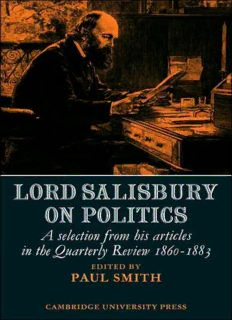
Lord Salisbury on Politics: A selection from his articles in the Quarterly Review, 1860-1883 PDF
Preview Lord Salisbury on Politics: A selection from his articles in the Quarterly Review, 1860-1883
hord Salisbury on Politics Cambridge Studies in the History and Theory of Politics EDITORS MAURICE COWLING G. R. ELTON E. KEDOURIE J. G.A. POCOCK J. R. POLE WALTER ULLMANN For complete list of books in this series see page 387 Lord Salisbury on Politics A selection from his articles in the Quarterly Review, 1860-188$ Edited with an introduction and notes by PAUL SMITH Lecturer in History, King's College London CAMBRIDGE at the University Press 1972 CAMBRIDGE UNIVERSITY PRESS Cambridge, New York, Melbourne, Madrid, Cape Town, Singapore, Sao Paulo Cambridge University Press The Edinburgh Building, Cambridge CB2 8RU, UK Published in the United States of America by Cambridge University Press, New York www. Cambridge. org Information on this title: www.cambridge.org/9780521083867 © Cambridge University Press 1972 This publication is in copyright. Subject to statutory exception and to the provisions of relevant collective licensing agreements, no reproduction of any part may take place without the written permission of Cambridge University Press. First published 1972 This digitally printed version 2007 A catalogue record for this publication is available from the British Library Library of Congress Catalogue Card Number: 74-174256 ISBN 978-0-521-08386-7 hardback ISBN 978-0-521-04457-8 paperback Contents Preface page vii List of abbreviations viii Editors introduction 1 Bibliographical note no 'The Budget and the Reform Bill' (April i860) in 'The House of Commons' (July 1864) 159 'The Reform Bill' (April 1866) 193 'The Change of Ministry' (July 1866) 226 'The Conservative Surrender' (October 1867) 253 'The Programme of the Radicals' (October 1873) 292 'Disintegration' (October 1883) 335 Index 377 Preface My thanks are due to Mr Maurice Cowling, who suggested this edition, and has cast a helpful editorial eye over it (without, of course, incurring any responsibility for its blemishes); to the Marquis of Salisbury, who has very kindly allowed me to quote from the Salisbury Papers at Christ Church, Oxford; to the librarian of Christ Church, Dr J. F. A. Mason, who most courteously aided my work there; to Messrs Hodder and Stoughton, for permission to quote from Lady Gwendolen Cecil's life of her father; and not least to my wife, who has patiently borne with my unreasonable working habits. A few words are necessary about the editing of the articles. Each is prefaced by an introductory note, designed to supply the essential background. Otherwise, annotation has been kept to a minimum, in the belief that a heavy apparatus of footnotes would be more of an impediment than an aid to the articles' use. An outline historical knowledge has been assumed in the reader, and therefore of the very large number of events, persons, and pronouncements, historical and contemporary, to which Salisbury alludes, only those not figuring prominently in general history receive notes. In the introductory note and footnotes to each article, Lord Salisbury is given the title by which he was known when the article was written (i.e. Lord Robert Cecil to 1865, Viscount Cranborne from 1865 to 1868, and Lord Salisbury thereafter). PAUL SMITH Kings College London November 1971 vn List of Abbreviations B.Q_.R. Bentley s Quarterly Review Cecil, Biographical Studies Lady Gwendolen Cecil, Biographical Studies of the Life and Political Character of Robert Third Marquis of Salisbury Cecil, Salisbury Lady Gwendolen Cecil, Life of Robert Marquis of Salisbury Q,R. Quarterly Review S.R. Saturday Review Vlll Editor's Introduction SALISBURY'S JOURNALISM THE third Marquis of Salisbury led the Conservative party for twenty-one years (the first four in tandem with Sir Stafford Northcote), and was prime minister for nearly fourteen of them. He was arguably 'the most formidable intellectual figure that the Conservative party has ever produced'.1 He was also one of the dominant European, indeed world, statesmen of the last quarter of the nineteenth century, hardly inferior in stature even to Bismarck. Yet, compared to men like Peel or Disraeli, he has not occupied the place in the Conservative hall of fame or received the attention from historians that might seem to be his due. The failure to bulk more largely in party hagiography is perhaps not difficult to understand. Though the Conservative party enjoyed what was in many ways its heyday under Salisbury's leadership, it is hard to say that his role was crucial to its success, or that he gave to it any distinctive impulsion or policy that can be accounted fundamental in its development. Both Peel and Disraeli can be seen, with varying degrees of accuracy, as having played a vital part in the making of the modern party by fostering its adaptation to the political consequences of economic and social change, as crystallised in the Reform Acts of 1832 and 1867. Salisbury's Conservatism, though not diehard, was more of the resistant than of the adaptive variety: the core of his early political career was his virulent opposition to 'democracy' as expressed in the Reform movement of the sixties, and in power he seemed to men like Lord Randolph Churchill to be unsympathetic to the cultivation of mass support made necessary by the extension of the franchise. His mature achievement, and interest, lay rather in the field of foreign and imperial affairs than in home policy. In an age of democratic politics centred largely on social issues, Salisbury seems to belong to a distant and antipathetic tradition, the last grand aristocratic figure of a political system that died with Victoria, or even before, a great whale irretrievably beached on the receding shore of the nineteenth century. Into the 'progressive' strain of modern Conservatism he simply will not fit. 1 R. Blake, Disraeli (1966), p. 499.
Description: